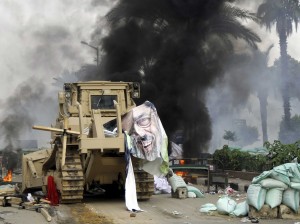 It would have been easy to be shocked by the absolute hypocrisy of Western powers in interpreting democracy and human rights, but their barefaced lies, pretexts and outright deceit have been repeated so often and so blatantly that few seriously accept, or even bother with the charade of western politicians when they rave on about democracy and human rights anymore.
It would have been easy to be shocked by the absolute hypocrisy of Western powers in interpreting democracy and human rights, but their barefaced lies, pretexts and outright deceit have been repeated so often and so blatantly that few seriously accept, or even bother with the charade of western politicians when they rave on about democracy and human rights anymore.
Britain and France were quick to recognise the military dictatorship that toppled the democratically elected government in Egypt, and barely a word of condemnation was heard from them when the military embarked on extremely violent and bloody crackdowns on citizens engaged in a peaceful protest for the return of democratic rule. They are yet to speak against ongoing arrest and incarceration of protest leaders and other individuals.
By contrast, even before the blood had been washed off the streets and pavements of Cairo, an opportune diversion came with the alleged use of chemical weapons by the government of Syria’s Basher Al-Assad. The timing of the alleged attack to coincide with the visit of United Nations inspectors is as curious as the speedy declaration by the West that it had evidence that indeed, chemical weapons had been used by government forces.
While the use of any weapon of mass destruction – by any party – is a heinous crime against humanity, the contrasting approach to the Cairo massacres and the Damascus attack seems to send the message that if you want to kill hundreds or thousands of innocent people, don’t use chemical weapons or nerve gasses of any sort; use live ammunition, tanks, artillery, mortar, helicopter gunships – and every other weapon in one’s arsenal.
And this, exactly, is the crux of the matter: The way the West chooses which shade of democracy to accept or not. In 1992, parties with Islamic roots were poised to win elections in Algeria, but the elections were annulled, sending the country into two decades of conflict. Rather than accept free and fair elections won by a party with Muslim ties, the West would rather see a country torn apart by strife and civil war, or impose invisible, but highly effective and crippling sanctions on countries that elect parties the West disapproves of.
Similarly, when Hamas, a political and military group opposed to the occupation of Palestine won free and fair elections in Gaza, it was promptly embargoed by the West, while Israel imposed a vicious blockage that remains in force today and has reduced Gaza to the biggest open jail in the world.
Also, despite regular elections and change of leadership which is a key aspect of democracy, the West derides Iranian democracy. Sure, there are restrictions, but Iran – Ayatollahs and all – is certainly closer to democracy than some countries in its immediate vicinity where the very notion of elections is anathema: Western duplicity would rather form strategic political and military partnerships with absolute monarchies than accede to fledgling democracies of a different shade.
When the Arab Spring began, Western nations were stumped because ordinary Arabs were suddenly rising against the oppressive regimes the West not only tolerated, but in many instances strongly backed. Behind the scenes, Western policy was to try to subvert the process, or that failing, turn it to their advantage. In Libya, Britain and France used the remnants of their fast-fading militaries to attack Muammar Ghaddafi and hijack the uprising to their advantage, though only American strikes ensured their victory.
In Tunisia, and more recently, Egypt, where revolutions led to the collapse of dictatorships heavily supported by the West, and where elections resulted in the victories of parties whose shades of democracy were not acceptable to the West, the methods were more subtle; invisible and undeclared sanctions to squeeze their economies to make life difficult for the citizens and create the impression that ‘Islamists’ could not govern effectively.
In both countries, worsening economic conditions were exploited to create discontent: In Tunisia, protesters have called for the resignation of the new government, while in Egypt, President Mohammed Morsi was given barely one year to solve decades old problems. Very curiously, the moment the military announced the coup, bread, fuel and other essentials which intriguingly had been in short supply became available, in addition to billions of dollars of foreign aid.
The only bit of cheer is that Britain and France are too economically fragile to carry out any sustained military action anywhere on their own, while the United States is war-weary after its ultimately futile exertions in Afghanistan and Iraq. They are therefore wary of embarking on another Middle East war simply because a country’s shade of democracy does not appeal to western economic and political palates, or just because a dictator used weaponry that offends western sensibilities to carry out mass murders.
The question is, on what basis should the West preach democracy, freedom and human rights when they only accept democracies whose terms they dictate and whose leaders they control, or when they prefer a brutal military dictatorship than a democracy of a different shade?
